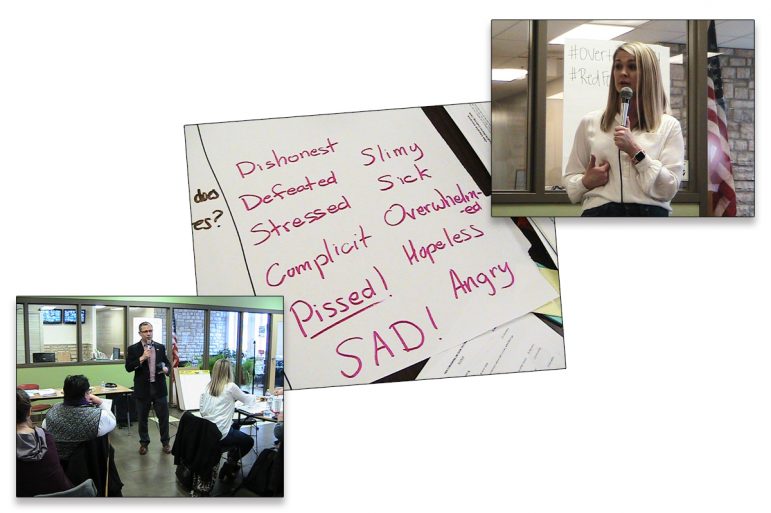When Anxiety Over Takes a Test
Guest Blog by a member of the OEA/Eastern Local CTA | The actual name has been withheld to protect the identity of the student.
I recently read the article in the February edition of “Ohio Schools” and it brought to mind not one of my students but that of my own son’s testing anxiety when he was in the 6th grade.
“…what his teacher who was proctoring the test told me left me heartbroken for him.”
 It was the first year the Partnership for Assessment of Readiness for College and Careers (PARCC) was given.
It was the first year the Partnership for Assessment of Readiness for College and Careers (PARCC) was given.
My son is an excellent student who is high achiever, so I can’t put all the blame on the test or even his teachers. I do know that he verbally and physically showed signs of severe stress in the weeks up to taking the tests that spring, which is a good sign that he valued the importance of it, but what his teacher who was proctoring the test told me left me heartbroken for him. She said that at the end of one test session he was so overcome with anxiety that he started stabbing himself in the forearm with his own pencil.
Upon hearing this, I had a long talk with him about the importance of standardized testing for students at his grade level. I told him that the only one’s held accountable for the scores were his teachers and his district.
He’s now a freshman in high school who has already taken the ACT, has straight A’s, and will be dual-enrolled in classes at a local university next year through College Credit Plus. He still has anxiety about testing, but at least knows that he will be held accountable for his performance to not only graduate but eventually earn a degree. | #OverTestedOH #RedForEd
The author is an English Language Arts educator and a member of Eastern Local CTA
![]()
Click here for more #OverTestedOH & #RedForEd Voices and How to Make a Stand
Computerized Testing — A Revolution That Wasn’t
By Kim Snyder of the OEA/Wadsworth Education Association
 I am writing after reading the recent article in the February 2019 issue of “Ohio Schools”. I cannot even begin to tell you how much I despise the state-mandated tests we must administer.
I am writing after reading the recent article in the February 2019 issue of “Ohio Schools”. I cannot even begin to tell you how much I despise the state-mandated tests we must administer.
We have lived through the Ohio Achievement Test (OAT), the Ohio Achievement Assessment (OAA), the Partnership for Assessment of Readiness for College and Careers (PARCC) — and now, the worst of them all — the American Institute of Research (AIR)1 tests.
SILENT PROTESTS
I am in my 15th year of teaching and during this time, just like every other teacher, I have seen children panic, cry, vomit, etc. I’ve had students refuse to write/type the required essays in defiance of the tests. Moreover, as if in silent protests of frustration, I’ve had students finish these state-required tests in record time because they no longer cared to try. I can’t say or do anything or risk losing my teaching license. I spend the entire school year building my students’ confidence and gaining their trust; I can see by the look in their eyes that both have been eroded when they take those tests.
“I just think of all of the other things I could do if I didn’t have the ever-changing state mandated tests constantly hanging over my head.”
I have students who fear they won’t be promoted to the next grade if they don’t pass their current AIR tests. I know it’s a residual fear from the Third-Grade Reading Guarantee. I reassure them that the AIR tests do not determine their advancement. What I don’t tell them is that the only one held accountable here is me [and the school, and overall, the district]. Last year, I earned a 100% grade-level passage rate last year, so I am not writing with sour grapes in mind.
Because the standardized tests are online, there is so much pressure to get everyone logged in properly and not have a technology crash. Research shows that children are better assessed from paper and pencil, but here we are. As Julie Holderbaum said, the icing on the cake is that the computer is going to grade the essays. How is it even possible for a computer alone to determine true student learning?
[ Related Blog: Power and Potential of Our Stories By Julie Holderbaum, Minerva EA/OEA ]
Since we aren’t allowed to see the test in advance or during its administration, we educators are aiming at a moving target. If I didn’t have to teach to a test, I could teach poetry. My fifth-grade English Language Arts classes have not had a poetry unit in three years. Why? Because there isn’t time. As a passionate ELA teacher, it breaks my heart not to share the beauty that poetry holds, but cuts need to be made somewhere.
Instead, I have to spend far too much time teaching my students to answer bizarre “Part A/Part B” questions and how to write a five-paragraph essay. I know adults who can’t write a five-paragraph essay; but, my ten- and eleven-year-old students need to know how to do this.
I don’t think Swiss Psychologist Jean Piaget (1896-1980) would say this is appropriate for my students’ stage of cognitive development. Additionally, I’m expected to differentiate in the classroom; however, all of the children take the same test. How is that fair?
TRUST US: WE’RE PROFESSIONAL EDUCATORS
The state has a Third-Grade Reading Guarantee; it should support it. That would help to ensure that the students in my fifth-grade class would be at the appropriate reading level. State educator leaders (and legislators) should trust that the 600+ school districts of Ohio, have hired honest, responsible teachers who take pride in their craft and in their desire to teach the next generations.
Trust us to do our jobs and we will prepare our children in the best way possible. Imagine what we could do with at least a month added back to our teaching plans.
- The PARCC and AIR assessments replaced the Ohio Achievement Assessment (OAA) and will replace the OGT (Ohio Graduation Test) starting with the class of 2019. The Ohio Department of Education worked with volunteer educators and the American Institute of Research (AIR) to develop the Third-Grade English Language Arts test. This test uses the same testing platform as state-mandated standardized tests.
![]() Kim Snyder is a 5th-grade regular-education as well as a Gifted English Language Arts educator with
Kim Snyder is a 5th-grade regular-education as well as a Gifted English Language Arts educator with
Wadsworth City Schools and member of the OEA/Wadsworth E.A.
I Don’t Wanna Go to School!
OEA Guest Blog | Sarah, Western Reserve Education Association / OEA
I want to paint a picture for others struggling with their children and testing.
I want lawmakers and politicians to see what this is doing to our youngest learners.
Like many other third-grade students, our daughter is taking the Third-grade Reading Guarantee.
We are blessed with a bright child that has a love of reading. She also has an Attention-deficit/hyperactivity disorder as well as anxiety.
She is on a 504 Education Plan and receives accommodations for standardized testing.
As the day of the Third-grade Reading Guarantee test approached, she was beside herself with anxiety in a roller coaster of emotions ranging from extreme sadness to feeling out of control.
On the day of the test, all morning, while preparing to leave for school, she alternated between crying and whimpering.
Her biggest fear was not the test. It was not being retained in third grade. And it was not her inability to type or read well. Her biggest worry was…sitting still. This articulate, bright, above grade-level reader was worried about the ability to remain seated for the test. She said to me, “Mom, I can’t sit still for that long. I’m not allowed to get up and I can’t sit still!”
Why have we done this to our children?
Why is an eight-year-old child, or any child, expected to sit in front of a computer and type multi-paragraph essays? This does not prove whether someone is an excellent reader. It proves who can pay attention, who has good computer skills, and who has grit to maintain the testing process.
At the end of the day, our daughter did well in the fall testing period — amazingly well — scoring at the top of her district.
She’s going onward to the fourth grade and doesn’t need to worry anymore about the Third-grade Reading Guarantee. But, here’s the clincher; she will take the test again in the spring! Still, she must endure another round of testing even though she proved four months earlier that she can read at grade level. She must experience this level of anxiety all over again and for no reason. She is beside herself with worry, crying, and not wanting to go to school.
I ask again, why are we doing this to our children?
*The 504 Education Plan is developed to ensure that a child who has a disability identified under the law and is attending an elementary or secondary educational institution receives accommodations that will ensure their academic success and access to the learning environment.
Sarah is a proud parent, educator and a member of the Ohio Education Association
OEA VP Scott DiMauro: Graduation Requirements & State Takeover
(MARCH 12, 2019 • COLUMBUS, OH) President Kohler, Vice President McGuire, Superintendent DeMaria, and members of the Board, my name is Scott DiMauro.
I am a high school social studies teacher from the Worthington Schools currently serving as Vice President of the Ohio Education Association.
On behalf of OEA’s 122,000 members, I appreciate the opportunity to provide comments on the Resolution on today’s agenda to supplement and clarify the high school graduation requirements recommendations addressing Section 5 of House Bill 491.
We appreciate the good work of State Superintendent Paolo DeMaria and the State Board of Education in your efforts to come up with recommendations for a new, permanent set of graduation requirements that, in accordance with Substitute House Bill 491, “reduces reliance on state testing, encourages local innovation, and supports student readiness for a career, college and life.”
In particular, OEA supports the superintendent’s recommendations to support students with deliberate planning and career advising, to provide early intervention for middle school and high school students not on track to meet graduation requirements, and to provide training for teachers and others who will evaluate non-standardized demonstrations of student learning.
We urge the Board to go further in looking at ways in which to instill creativity, imagination and a desire to learn in the high school experience by rolling back the excessive burden of standardized testing.
Ohio is in the minority of states that exceeds minimum federal testing requirements for high school students. The number of end-of-course exams, as well as the stakes attached to them, must be reduced.
For example, the testing burden could be further reduced, and teachers given more time to teach, by re-examining the ACT/SAT testing requirements, and reconsidering what is needed for career-technical and other students who are pursuing alternative pathways to graduation.
It is also important that educators have access to reliable test item analysis information that will help them better prepare their students for success.
In any deliberations related to testing and graduation requirements, we urge policymakers to show that they value the professionalism and good judgment of Ohio’s educators who have dedicated their careers to the success of all our students, including incarcerated youth, students with disabilities, English learners, students with interruptions in their formal education, students in poverty, and students of color.
And last, but not least, OEA urges the Board to stick with its original recommendation to have new graduation requirements take effect with the class of 2022.
It is simply unfair and unreasonable to expect that students who are already half way through their high school careers should be expected to meet a whole new set of requirements for graduation.
They, and the education professionals who support them, need time to plan for these changes. The original Superintendent’s Advisory Committee, which consisted of representatives of the K-12, higher education, and business communities, was right to recommend that any new requirements take effect with an incoming freshman class.
We encourage the Board to stand by the recommendation passed in November 2018 and reject an acceleration of the implementation timeline as presented in the draft resolution before you today.
Thank you for your time and attention.

Scott DiMauro
February 2019 Ohio Schools Magazine
- Cover Story: Driving Literacy, Princeton A.C.E. Find Success With Mobile Book Center
- Feature Story: OEA members on using power to create change at 2019 Advocacy and Organizing Institute
- Political Action: The power and potential of our stories to stop the testing insanity
- Legislative Update: OEA Priorities for the 133rd General Assembly
Moved recently? Contact the OEA Member Hotline to update the address on file at 1-844-OEA-Info (1-844-632-4636) or email, membership@ohea.org. Representatives are available Monday-Friday, from 8:30 a.m. to 6 p.m. | OhioSchools — Past Issues
![]()
![]() Oh Yes, We’re Social — Join the Conversation!
Oh Yes, We’re Social — Join the Conversation!
![]()
The Hook of Standardization
Guest Blog | By Matt Jablonski, Elyria EA/OEA
 I have spent all but a few of my 20 years in education teaching a tested subject on which a student’s graduation is dependent. To say that this has had a negative impact on my career and the lives of my students is as obvious to me as the correlation between median income and standardized test scores.
I have spent all but a few of my 20 years in education teaching a tested subject on which a student’s graduation is dependent. To say that this has had a negative impact on my career and the lives of my students is as obvious to me as the correlation between median income and standardized test scores.
I am an American History teacher at Elyria High School, in one of Ohio’s urban districts. When the state planned its switch to the OGT, we were proactive. What we understood, what most educators understand, is that scores on standardized tests best correlate to economic status.
In a district with high rates of economically disadvantaged students, there would likely be high rates of students unable to graduate due to the tests. In an otherwise meaningless system, seemingly designed to see us fail, it was our job to get students to pass the assessment. Under the end–of-year assessments the same is true.
While some districts may not even need to think twice about their student’s success on state assessments, many of us need to place every ounce of our effort into strategies that point directly to an end game that has little to do with student college and career readiness, nothing to do with the joy of learning, and everything to do with an arbitrary score on a standardized test.
“An educational system driven by standardized assessments has run its course.”
In the interest of success in an urban district, educators like myself have tried to stay ahead of the curve. We have adopted new standards and adapted curriculum, written common assessments and analyzed the data. We used the language of assessments even though it’s not the vernacular of our students, found source material and written questions that look and sound like a standardized test. We taught the methods of responding to short answer and extended response questions even though their usefulness was restricted to state tests, and is utterly removed from any relevant academic writing outside of this environment. Despite the natural course of student interest, we paced ourselves to cram the content into the space and time prior to the spring assessment window.
 Predictably, we saw few victories, all relative to the level of poverty in a given district. And while the state of Ohio continues to insist that standardized tests are an accurate measure and the recipe for increased achievement, generations worth of data prove otherwise.
Predictably, we saw few victories, all relative to the level of poverty in a given district. And while the state of Ohio continues to insist that standardized tests are an accurate measure and the recipe for increased achievement, generations worth of data prove otherwise.
The Ohio Department of Education, in fits of madness only it understands, riddles its social media accounts with adept performances from the state superintendent celebrating students and teachers, as if we are too dimwitted to notice that they back assessment and evaluation systems designed to label us as failures.
Believe me, I remember the kids I’ve taught who didn’t pass their American History assessment. I remember their faces, the level of concern and anxiety. As teachers, we internalize these things. It is a part of sound compassionate practice. I’ve spent hundreds of hours developing and teaching remediation courses, so these students might have a shot to get the appropriate score on the second, or third, or fourth try.
The fundamental problem is, even when a student ultimately earns the required score, there is relief, but it’s not as if there is a great sense of accomplishment.
“Where is the meaning in being deemed successful in a meaningless system?”
No college or trade school is looking at the performance as a component for acceptance. No employer is interested either. The greatest predictor of college success is still Grade-Point Average, not standardized test scores.
What did we accomplish exactly?
Grinding out success in a system that expects you to fail can only carry you so far, and for teachers, there is always the next group of kids to deliver through the same awful system.
In a profession that is at its best when relationships and curiosity are nurtured, individuality and interest are paramount, and collaboration and creativity should be celebrated; all of us have been squeezed into an educational experience that celebrates standardization.
My career has been devoted to the necessary, but misguided task of trying to bring humor and joy to an education system that seems hell-bent on eliminating it, to introduce content steeped in relevance within a system that asks questions outside of any relevant context, to help students find meaning in a world where a major component of their education is utterly meaningless.
An educational system driven by standardized assessments has run its course. It is time for a change. #OverTestedOH
Matt Jablonski teaches American history teacher at Elyria High School in Lorain county.
You can follow Elyria EA on Facebook or visit their website: www.EyriaEA.ohea.us.
![]()
|
|
![]()
Silent Tears
#OvertestedOH #RedForEd
OEA Guest Blog | By Tina Allen, ColumbusEA/OEA
 I am a fourth-grade teacher in Columbus City Schools.
I am a fourth-grade teacher in Columbus City Schools.
One of the most devastating and heartbreaking days of my teaching occurred when one day, unexpectedly, one of my students silently put her head down on her desk. Upset with her score on a state-mandated middle-of-the-year test, she began to cry.
She had begun the new school year on the heels of attending summer school because she was unsuccessful in passing the high-stakes Third-Grade Reading Guarantee the year before.
Traumatized By Testing
She had been traumatized by testing. I had seen that expression before. I’ve discussed it with other educators as well as have seen it in other students equally traumatized by the testing process.
As the tears ran down her face, I was speechless and felt disgusted inside.
“I joined this profession to change lives, to educate, motivate and inspire. High-stakes testing almost took that away from me”
Had Testing Traumatized Me Too?
“What had I done?” I asked of myself.
Recognizing she had at least two more standardized tests on the horizon as well as I-Ready assessments, reading assessments, and progress monitoring, I then asked myself, “How can I help her through this? “
It made me realize that unknowingly, I, too, had been traumatized. I was becoming to concerned about “what they needed to know to pass the test” versus “what are they are learning.” Yes, I am advocating for a reduction in high-stakes testing and the creation of alternative pathways for promoting students onward to the next grade.
I joined this profession to change lives, to educate, motivate and inspire. High-stakes testing almost took that away from me.
The tears of a fourth grader reminded me what’s important.
Tina Allen is a member of the ColumbusEA/OEA and a fourth-grade educator at Columbus Cassady Elementary School
![]()
Click here for more #OverTestedOH & #RedForEd Voices and How to Make a Stand
Our Stories — #OvertestedOH #RedForEd
Guest Blog | By Courtney Johnson, ColumbusEA
 I am a high school English teacher turned school librarian at Columbus Fort Hayes Arts and Academic High School. Literacy is my life’s work. I’m a National Board-Certified English teacher with a reading endorsement and a Master’s in Library Science.
I am a high school English teacher turned school librarian at Columbus Fort Hayes Arts and Academic High School. Literacy is my life’s work. I’m a National Board-Certified English teacher with a reading endorsement and a Master’s in Library Science.
I spend my days working with students and teachers, helping them find books, conduct research, and write essays. I help run a free school store in the library’s auxiliary space for students in need.
During the fall 2018-19 administration of state-mandated tests, I spent three weeks — 15 instructional days — away from the job that I love. Instead, I administered nearly 900 end-of-course test retakes. This meant that for three weeks our students did not have access to the resources of the school library or librarian.
“…I love my Job! Yet, I felt complicit in a crime.”
DIFFICULT THREE WEEKS FOR EVERYONE
Unfortunately, I was not the only one negatively impacted during those three weeks.
These assessments also tied up our two school counselors, who should be able to spend their days supporting students in crisis and helping them plan for their futures. Educators across our school were pulled away from instructional time to help meet the need for test administrators.
Intervention Specialists, who are required to serve all students with an Individual Education Plan (IEP), lost a combined 22 hours of traditional instruction time in providing necessary extended-time and small-groupings for students, some needing to retake all seven tests.
We all lost no less than three weeks of valuable instructional time.
AN EMPTY SEAT
Shakespeare once wrote, “Grief fills up the room of my absent child.” We all suffer when students are absent from classes. During this three-week period, that grief took on many forms.
One Senior tried coming to school late to avoid the test, and then refused to leave her English class. Our school safety officer was able to convince her to come to the library to take the test. She wasn’t alone.
- Students enrolled in our carpentry program refused to miss their morning trade classes to take the state-mandated tests. (One student told me he has been working with his dad as a carpenter since he was 10. He believes he will never pass the state-mandated tests, and why does he need to? He has straight A’s in carpentry class, and a solid plan for his future.)
- Another anxious student went home vomiting.
- A student who lost her home overnight begged not to take the test. She just couldn’t handle it. We couldn’t make her.
- Another student confided in me that he used drugs and alcohol to de-stress from the anxiety caused by the test.
Day after day, I watched as Seniors dragged themselves to our school library for the tests. Our library is a place normally vibrant and alive — just ask any of the 270 student participants of my school’s book club. However, as a designated testing area, the library had become a place filled sleepy-eyed students with defeated spirits. I would hug them, and say, “You’re almost finished. Hang in there.” I did the only thing I knew to do: be kind.
“It is wrong to subject young people to this much testing…. I called my union.”
Yet, I felt complicit in a crime. I knew I needed to stand up for them. So, I called my union.
OEA CONVENING ON OVER-TESTING
My local president, John Coneglio, and OEA Vice President Scott DiMauro, listened to my concerns, and we went to work to fight back against this over-testing of students.
The first outcome was the Convening on Over-Testing, January 26, 2019, in Columbus. More than 80 educators from across the state convened to examine further the issue. We began by asking participants to talk about why they came and to record their feelings about testing as they discussed with one another. We collected these words to create the image below.

Federal minimum testing guidelines require only one English, one math, and one science assessment during high school. In Ohio, we ask high school students to take more than double that amount, and we attach high stakes to them – for our students and our schools.
These tests are at the heart of so many education policies in Ohio from the State Report Card to HB 70 (the State Takeover Bill) to Value-Added teacher evaluations. We do not have to do this to children. Only 11 states in our nation continue to subject students to high stakes testing.
I don’t know a single educator who isn’t feeling frustrated, overwhelmed, or heartbroken by this soul-crushing, over-testing of students.
A colleague of mine described our state of standardized testing as feeling like “both prisoner and warden.” Educators feel hopeless, and yet we must do all we can to get kids through a faulty measure, or else our value-added scores determine that we need the state to take over our schools.
Even the written answers are scored by computers. There is no humanity left in this policy. Kids are reduced to numbers on a spreadsheet.
SHARING OUR STORIES
We all have stories to tell about the effects of high stakes standardized testing on our students, their families, and our schools – stories like I mentioned above, and stories like these we heard on Saturday:
- An Intervention Specialist has to tell parents that their children with Multiple Disabilities are not on track to pass the Third Grade Reading Guarantee (3GRG).
- A second-grade teacher’s student hid under a desk and cried rather than take the MAP test.
- A high school career education teacher said, “I want my kids to be smarter than the robots they’ll work alongside of and preparing them to take tests is not how we do that.”
- A middle-school gifted-cohort teacher’s high-achieving students asked why their hands-on projects had to be interrupted to take a practice test.
And my own family’s story: my son, Brady, was in the first group of students under the 3GRG law. Literacy is my life’s work. I read to my son every day of his life. He had high-quality preschool. Our home is a literacy-rich environment. He loved books and stories. And then the 3GRG made his first-grade teacher hyper-focus on his reading level, and it made him HATE reading. He entered into an endless cycle of test and remediate. This vicious cycle continues to happen across our state.
WE ARE TESTING LESS TEACHING AND LEARNING
At this point, I wonder what are we even testing? With more testing comes LESS teaching and LESS learning. We need time to teach, and our students need time to learn. They do not deserve this toxic testing environment that our state legislators have created.
In 2011, I became a union activist. When the Governor and our state legislature attacked our collective bargaining rights, we found a way to say, “This is wrong. Let me tell you why.” We need to find our voices again.
Here is where you can help. Write your story. Ask your students to write their stories. Ask families you know to write their stories.
TIME TO TEACH, TIME TO LEARN
We need time to teach, and our students need time to learn. It is time our state legislators — the folks with the power to change these laws — hear our stories. Our voices must be louder than the testing lobby. Here’s how:
#OverTestedOH | #RedForEd — Call To Action
- Invite legislators to your school as well as events
- Attend an upcoming OEA Educator Lobby Day to share your story
- Send your story to your state legislators and to Governor DeWine
- Ask your local school board to pass the Time to Teach, Time to Learn resolution
- Click here for a sample resolution (Please check back Tues. Feb 12th)
- Share your insights in the comments section of OEA’s Voices of Change blog
- Submit your story as a formal OEA blog (300-500 words) entry to: webmaster@ohea.org
- When posting to social media use the hashtags #OverTestedOH & #RedForEd
Courtney Johnson is a member of the @ColumbusEA/OEA, and an English teacher turned school librarian at Fort Hayes Arts & Academic High School.
![]()
|
|
![]()
Power and Potential of Our Stories
By Julie Holderbaum, Minerva EA/OEA
 A teacher walks into a bar.
A teacher walks into a bar.
No, this is not the beginning of a joke, or the beginning of a commentary on the challenges of public education driving teachers to drink (well, not really).
It’s the beginning of a testing story.
I was the teacher, and it was a holiday weekend in my small town a few years ago.
I felt a bit like Norm on Cheers when I walked in. “Miss Moffett!” the kids nearest the door yelled. (I hadn’t been Miss Moffett for years, but just as these young adults would always be “kids” to me, I would always be Miss Moffett to them).
There were hugs and smiles, and a few offered to buy me a beer. As we caught up, the conversation turned to the days when they had been students in my class. They had lots of good memories.
(Fill in the upcoming blanks with fun and meaningful, but time-consuming activities).
“Do you remember when we ______?”
“Do you still do that activity where we _______?”
“Do you still teach _________?”
My answer was always, and sadly, that I don’t do any of those activities anymore. Why? Because I have slowly but surely allowed testing to dictate what and how I teach.
The lessons I teach now are not what I enjoy teaching and they are not what their kids enjoy learning and frankly, it makes me sick.
My former students were happy to see their old teacher Miss Moffett. But I’m afraid that now, if they see their children’s teacher Mrs. Holderbaum out at a bar, instead of offering to buy me a beer, they might throw one in my face.
The lessons I teach now are not what I enjoy teaching and they are not what their kids enjoy learning and frankly, it makes me sick.

And I’m Not Alone
On January 26, 2019, over 100 Ohio public school teachers met to share stories about how testing has impacted our classrooms.
There were stories of kids of all ages puking and crying on test days.
There were stories of teachers basically “bird-boxing” as they helped students with technical issues during an AIR test, so great was the fear of breaking security protocol by looking at the actual test. There were stories of teachers considering leaving the profession because of the pressure of these high-stakes tests, and stories of teachers telling their own children that they would not pay for their college education if they went into teaching.
In one activity, we listed words that expressed our feelings regarding the overabundance of testing and what it has done to our students and to us. Want to hear a few just from the six people at my table? Sad. Anxious. Angry. Overwhelmed. Exhausted. Defeated.
Is that how we want to feel about our jobs? Is that how we want our students to feel about school?
We Have Two Choices
Of course not. We have two choices. Keep feeling that way while we continue to adapt to testing madness, or start pushing back and standing up for ourselves, our profession, and our students, and saying ENOUGH.
I’ve written about testing several times previously. After that encounter at the bar, I wrote an open letter to my former students apologizing in advance for the experience their kids would have in my classroom now that testing has taken over. I’ve written about the irrelevant and inappropriate test questions and the challenge of preparing my students to address those questions, and last spring,
I wrote about the absolutely insane fact that computers, not people, are now grading our children’s essay answers on the test. These pieces share my stories and voice my feelings about the impact of testing on my classroom.
But we need more voices. We need a chorus of voices so loud that we cannot be ignored. We need YOUR voice.
Share your story with other teachers; send your story to OEA at webmaster@ohea.org to add to the discussion of how real teachers and students are being adversely affected by testing insanity.
There is power in sharing our stories with each other; anyone who attended the meeting last weekend can attest to that. But that power turns into potential to change the situation when we share our stories with those outside the profession. We need to saturate the internet and bombard our legislators with our stories. We need our communities and our leaders to know that we will no longer be complicit by silently going along with the changes in education that are hurtful to our students.
Power of Social Media
Write your stories, and share them on your social media platforms, using the hashtags #OvertestedOH and #RedForEd.
Power of Legislative Contact
Then, write to your legislators, or better yet, visit them in Columbus or lobby them when they are at home in-district. Let them know how you feel, tell them how the testing affects your students; share your stories.
We need our legislators to hear our chorus of voices. We need them to hear what it’s like to have our careers and our classrooms commandeered by the demands and pressure of the tests. We need them to hear that Ohio’s children, instead of feeling excitement at the idea of going to school, are feeling dread. We need them to hear that because of the tests, we are developing anxiety in our students instead of curiosity, fear of failure instead of freedom to flourish.
Don’t be afraid of reaching out to your legislators because you don’t consider yourself a political person.
We are turning out test-takers instead of lifelong learners. Instead of being trusted as college-educated professionals who can factor in our students’ varying situations, challenges, strengths, and growth to determine whether or not they have succeeded at a level needed to pass our classes, we are being treated as assembly-line workers who must produce a uniform product that meets the same standards as every other product in the factory in the exact same way. This system might work well when producing products, but it’s no way to produce people.
But I am Not Political….
Don’t be afraid of reaching out to your legislators because you don’t consider yourself a political person. This is not a political issue. Children of both Republicans and Democrats are negatively affected by the over-testing in Ohio.
Ohio is one of only 11 states in the nation to require more tests of our children than the federal government mandates; it is our state legislators who have the power to change that.
And it is Ohio’s teachers who have the power to influence them to do so with our stories.
— Julie Holderbaum is an English Instructor and an Academic Challenge Advisor at Minerva High School, Minerva, Ohio.
![]()
Related Resource Links
- OEA 2019 Educator Lobby Days
- Find Your Ohio Legislators
- OEA Legislative Scorecard
- 08.16.2016 — A Teacher’s Open Letter to Ohio’s New State Superintendent
- 08.09.2016 —The 8 Olympic Events of Teaching
- 04.25.2016 — To All the Ones I’ve Taught Before
- 04.13.2015 — What to do about too much testing — Fight, Flee, or Fake It?
- 02.29.2016 — Who Really Deserves the F?
- 01.19.2016 — Tests With More Questions Than Answers
![]()
|
|
![]()
The School Report Card Sham
By Kevin Griffin of the @DublinEA/OEA
The state report cards have been around for several years. Their erroneous grades and convoluted metrics have been so well documented, that educationally, they are about as relevant as Kardashian reruns. It’s unfortunate that districts now need to deal with the annual damage control when they are released.
The real victims are our students.

It’s important for us to remember why these report cards were conceived. It was, quite simply, to make us look bad. The corporate reformers, with help from ALEC, created standardized testing, value-added, and then the report cards, as a way to convince the public their schools were failing. The public didn’t buy it.
But don’t count on the vultures to fly away when there’s money to be made. Despite the fact the legislature knows the report cards are full of problems and half-truths, they are still being used to shut districts down, a thought inconceivable not too long ago.
“But don’t count on the vultures to fly away when there’s money to be made.”
HB 70 uses the report card data to dismantle the school board and replace administrators with a CEO who can basically do whatever he wants. Youngstown and Lorain Schools have already been taken over, East Cleveland is in the process, and Dayton Schools is next in line. The slow, but steady process to turn every school in these areas into a charter school has begun.
The real victims are our students. The one thing the report card does show is an undeniable link between test scores and poverty. In fact, Ohio’s lowest performing districts, those with a performance score under 70, have eight times the number of low-income students as districts with a performance score of 100.
So now these students, the ones who need more support, stability, and love than all the others, will be transported to for-profit charter schools. And we all know how well that works out.
Kevin Griffin is a member of the @DublinEA and the Central OEA Vice President
This post originally appeared in the in Winter 2019 issue of the Communique, a publication of the Central OEA/NEA
![]()



